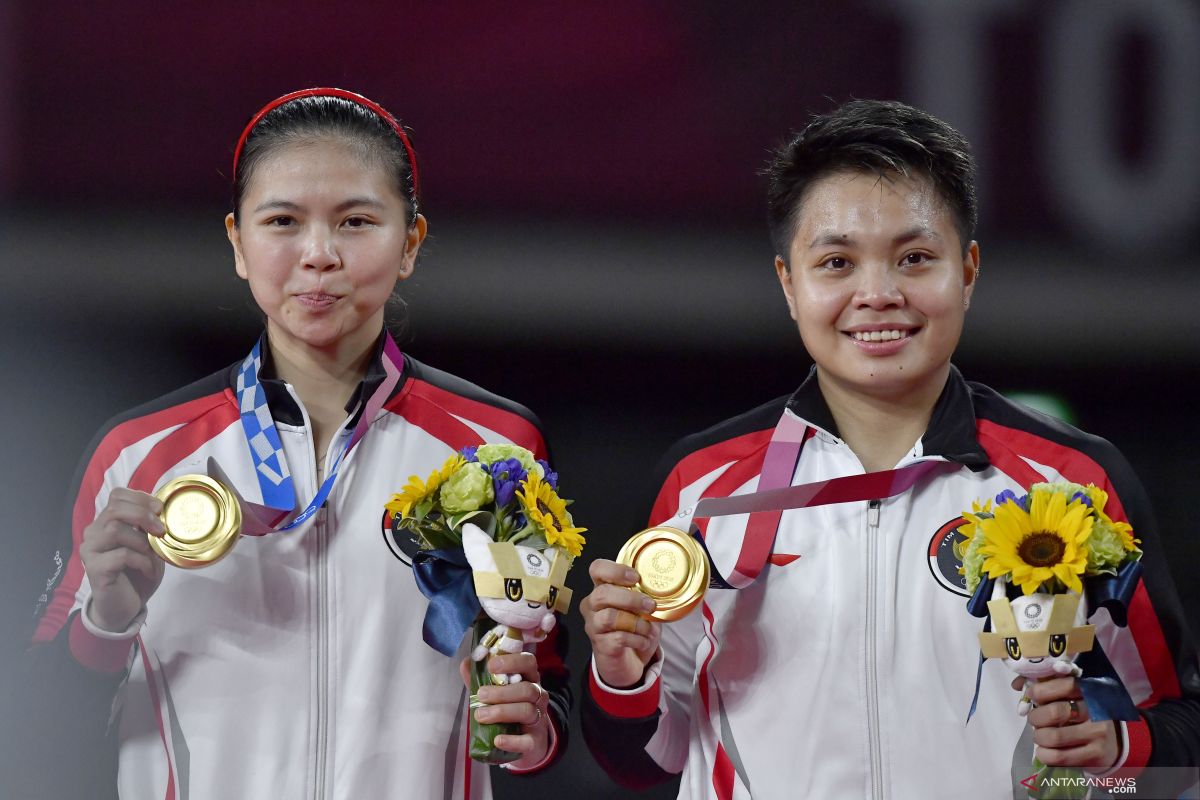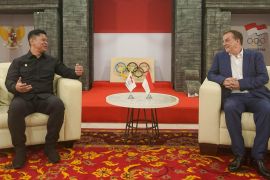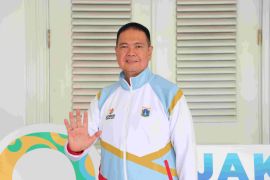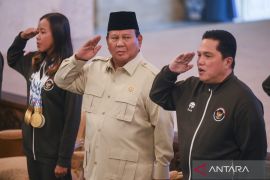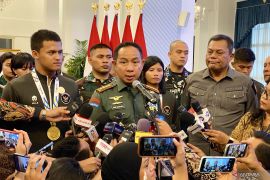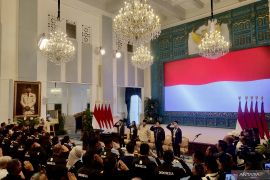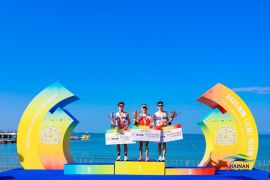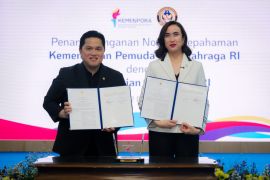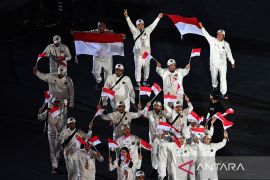They will train and study for ten years so that when they enter their golden age, they can participate in various international eventsJakarta (ANTARA) - On the 37th National Sports Day (Haornas) two years ago, President Joko Widodo (Jokowi) called for a complete evaluation of the Indonesian sports ecosystem, which he said needed improvement.
The President also highlighted that the management plan for coaching athletes must be well synergized, starting from the regional to the central level and from general education institutions to sports education institutions.
At the commemoration of the 38th National Sports Day, Minister of Youth and Sports, Zainudin Amali, introduced a blueprint for sports development, which was later named the Grand Design of National Sports (DBON), in response to President Widodo’s concerns, who had asked: "With 270 million people, the majority of whom are the younger generation, why does Indonesia still lack talented athletes?"
Related news: West Java emerges as overall champion at 2022 O2SN
Presidential Regulation Number 86 of 2021 has provided a legal umbrella for DBON, which was formulated with the help of sports policy makers, experts, academics, practitioners, and sports organizations, and it is expected to guide long-term sustainable national sports coaching and development policies.
As per Article 2 of the presidential regulation, DBON aims to improve the sports culture in the community, increase the capacity, synergy, and productivity of national sports achievements, and promote a sports-based national economy.
DBON also serves to provide guidelines to central and regional governments, sports organizations, businesses and industries, academics, and the public on the implementation of national sports so that national sports development can run effectively, efficiently, excellently, measurably, and in an accountable, systematic, and sustainable manner.
After DBON was officially introduced, dissemination and coordination with ministries and agencies were carried out. The coordination involved provincial and local governments, educational institutions, and several universities jointly creating a "factory" for fostering talented athletes from a young age.
Related news: VP Amin encourages daily exercise to achieve DBON targets
Minister Amali appointed four universities that had sports science faculties as DBON training centers for prospective athletes: the Indonesia Education University (UPI), Jakarta State University (UNJ), Surabaya State University (Unesa), and Semarang State University (Unnes).
Using universities as training centers was deemed appropriate because they have adequate sports facilities and supporting laboratories for sports science.
DBON implementation
Since it was first introduced one year ago, the implementation of DBON has started to be realized. The recruitment of prospective athletes has been carried out by universities, including Unesa and UNJ. The Ministry of Youth and Sports has carried out the selection process in accordance with predetermined conditions.
Unesa DBON technical manager Dwi Cahyo Kartiko informed that 26 people have passed the selection to take part in Unesa’s coaching program for taekwondo, archery, and swimming.
The selection process was carried out in keeping with the applicable standards in terms of anthropometry, health, and physical abilities, as well as skill tests for the specific sport that the participants chose.
Related news: Vice President hopes sports industry to contribute to economic growth
The needs of students selected for the DBON training program are fully covered by the state, including accommodation, transportation, pocket money, and tuition.
The universities provide medical personnel, physiotherapists, performance analysts, and biomechanics analysts to support the development of prospective athletes.
The UNJ has also started implementing DBON. Dean of UNJ's Sport Science Faculty, Johansyah Lubis, informed that 32 children, with an average age of 12, will take part in UNJ’s DBON program in five sports: athletics, shooting, archery, rock climbing, and BMX (bicycle motocross).
"They will train and study for ten years so that when they enter their golden age, they can participate in various international events," Lubis said in an interview with ANTARA.
The children will be trained by coaches and support personnel who have been recruited to maximize the DBON coaching program at the training centers.
Aside from facilitating training, UNJ and Unesa have also been tasked with organizing teaching and learning activities in special classes for athletes at laboratory schools. However, Lubis said that adjustments in the curriculum are needed so that athletes can stay focused on training without neglecting their responsibilities as students.
Related news: Role of National Sports Day in nation-building
Sustainable coaching
Despite the DBON, Indonesia's journey to sporting glory is expected to be long.
Former national badminton athlete Susi Susanti said that the key to creating champions is routine, well-planned, consistent, and sustainable coaching. In addition, athletes must be given the opportunity to compete in national and international events.
Even as the government seeks to enter the top 10 rankings at the 2045 Olympics, as envisaged by DBON, it must also consider coaching targets for the short and medium terms, namely SEA Games as a first step and Asian Games as the higher target, she observed.
Susanti, who bagged a gold medal at the 1992 Barcelona Olympics, further said that not all sports can be competed at the highest stage of the Olympics because each sport has a different level. It is hoped that the government will also make improvements to the development of sports that athletes still cannot participate in at international events, she added.
DBON has set 14 priority sports, which means they will receive more attention from the government, namely badminton, weightlifting, rock climbing, archery, shooting, wushu, karate, taekwondo, bicycle racing, athletics, swimming, rowing, artistic gymnastics, and pencak silat (traditional Indonesian martial art). However, out of them, only a few sports can be competed at the Olympics.
"Adjusting targets with capabilities, in my opinion, is one of the more measurable plans," Susanti said.
In addition to coaching, the former athlete also highlighted problems related to the welfare guarantee for athletes. Besides the bonus given by the government, athletes must also be provided a guarantee regarding their future after retirement.
The Sports Law, which is a revision of Bill Number 3 of 2005 regarding the national sports system (SKN), actually regulates the professional status of athletes. The law emphasizes the strengthening of sports as a profession and regulates the welfare and rewards for athletes, not only in the form of providing scholarships, employment, special promotions, and special recognitions, but also social security protection through the National Social Security System (SJSN).
On the 39th National Sports Day commemoration this year, Susanti said she hoped that sports would become one of the priorities and receive more attention, not only during big events such as the Asian Games and the Olympics but also in terms of guaranteeing the future of athletes.
The concern of President Widodo and Indonesians regarding the achievement of national sports may be answered in the next few years as long as the DBON continues to be implemented—especially since the creation of sports champions will involve a long journey that may well take years.
Related news: 1,257 personnel securing G20 Culture Ministers' Meeting in Magelang
Related news: Halim Airport's VVIP terminal ready to welcome G20 delegates: Minister
Reporter: Shofi Ayudiana, Raka Adji
Editor: Fardah Assegaf
Copyright © ANTARA 2022
